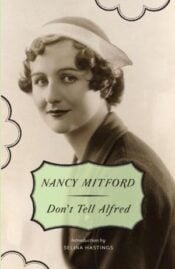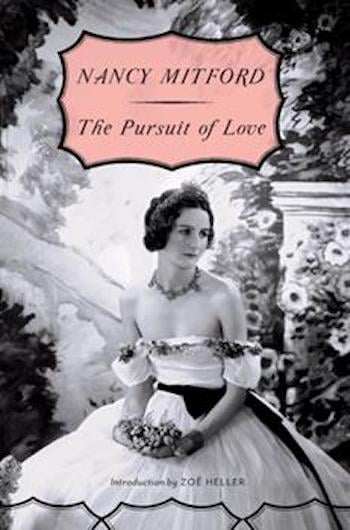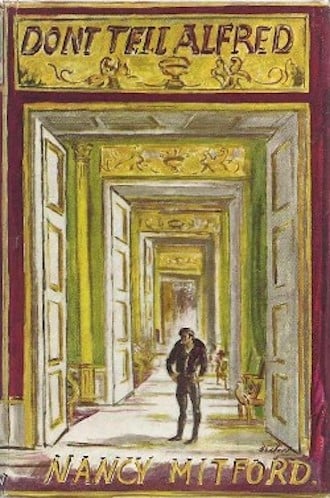Don’t Tell Alfred By Nancy Mitford (1960)
By Taylor Jasmine | On November 25, 2022 | Updated December 1, 2022 | Comments (0)

Don’t Tell Alfred (1960) was the last novel by British author Nancy Mitford (1904 –1973) and the final installment of the loose trilogy encompassing The Pursuit of Love (1945) and Love in a Cold Climate (1949).
Like the two previous novels, Don’t Tell Alfred is narrated by Frances (“Fanny”) Wincham. It takes place some twenty years after the previous two (whose timelines were more or less concurrent) and focuses on the narrator herself.
The Pursuit of Love and Love in a Cold Climate are told from her perspective but have different main characters, both of whom are cousins of Fanny.
And like most of Mitford’s other novels, Don’t Tell Alfred gently satirizes the mores and manners of the British upper classes.
As the novel begins, Fanny is middle aged with two teenage sons. Alfred, her stable, staid husband is still an Oxford don, but has suddenly been appointed as the British ambassador to France. The family moves to Paris, and from there, various complications ensue.
. . . . . . . . .

See also: The Pursuit of Love by Nancy Mitford
. . . . . . . . .
A brief description of Don’t Tell Alfred
From the publisher of the 2010 edition (Vintage books): In this delightful comedy, Fanny—the quietly observant narrator of Nancy Mitford’s two most famous novels—finally takes center stage.
Fanny Wincham—last seen as a young woman in The Pursuit of Love and Love in a Cold Climate—has lived contentedly for years as housewife to an absent-minded Oxford don, Alfred. But her life changes overnight when her beloved Alfred is appointed English Ambassador to Paris.
Soon she finds herself mixing with royalty and Rothschilds while battling her hysterical predecessor, Lady Leone, who refuses to leave the premises.
When Fanny’s tender-hearted secretary begins filling the embassy with rescued animals and her teenage sons run away from Eton and show up with a rock star in tow, things get entirely out of hand. Gleefully sending up the antics of mid-century high society, Don’t Tell Alfred is classic Mitford.
. . . . . . . . .

See also: Love in a Cold Climate by Nancy Mitford
. . . . . . . . .
A 1960 review of Don’t Tell Alfred
From the original review by Harriet Hill in The Gazette, Montreal, Quebec, Canada, December 10, 1960: Like snails, Nancy Mitford is a cultivated taste. Once a reader has acquired the taste. almost anything that comes from her pen proves edible. Sometimes she drips acid, at others, honey.
In her latest she moves in ambassadorial circles. (She frequented them in Paris for a good many years and now maybe she feels safe in paying off a few old scores.) Somebody once said, “You can tell a person almost anything if you smile when you say it.”
Nancy Mitford smiles blandly when pinpointing her attack on the foibles of the upper crust. Her Majesty’s Government pitched Fanny Wincham’s husband, Alfred, from the bucolic simplicity of Oxford into the UK Embassy in Paris.
Fanny embarks on her new wifely career in the world’s most chic capital with misgivings, ranging from her lack of smartness to absence of mental swiftness.
From then on, the Winchams take hold of problems ambassadorial and sons who keep appearing and converting the embassy into as outlandish a “home from home” as any reader would wish.
Fanny, a permissive parent in her own view (and certainly she could be called that in the view of others) has to put up with a son who starts to make quick money escorting elderly English people to the Costa Brava, another who is a Zen Buddhist and appears at the embassy complete with new wife and Chinese baby (not theirs) and two young teenagers who take French leave from Eton.
The other young problem — beautiful Northey who comes to Paris as Lady Wincham’s secretary and from then on has a string of elderly French parliamentarians to contend with as well as such unlikely pets as a rescued badger in the Embassy garden.
The Winchams move from crisis to crisis, public and private, in hilarious succession. The duel between the generations is as funny as anything in modern writing. If at times the nonsense threatens to become top heavy. remember this is Nancy Mitford and nobody else moves in her highly specialized groove as well.
. . . . . . . . . .

Original cover of the 1960 edition
. . . . . . . . . .
More about Don’t Tell Alfred by Nancy Mitford
Leave a Reply